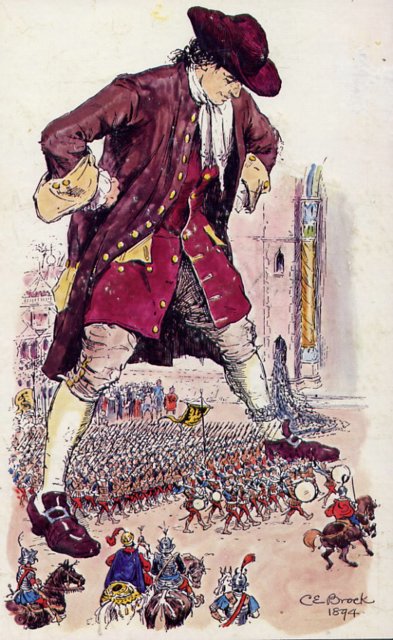
In Book I of Gulliver’s Travels, Gulliver lives in a world where he can be “above it all.” He can afford to be open-minded and generous because most issues don’t really affect him. Although he is, as his name suggests, gullible, it is gullibility that he can get away with.
I stress this point because I think that deliberate naivete is one way that people choose to live with the leaders they favor. They assume that the leader embodies the ideals that they believe in, and they are able to persist in this belief by taking the leader’s words at face value. Their gullibility serves as a shield against disillusion. They simply do not look too hard. They allow themselves to be fooled.
Swift wonderfully uses his story about size disparity to make this point. Gulliver never questions the emperor’s claims that he is the most powerful monarch in the world. In fact, we are treated to a hilarious scene where the “man mountain” prostrates himself before a four-inch figure. Gulliver describes, very matter of factly, the ridiculous games that courtiers must participate in to succeed at court. He reports, seemingly without judgment, the horrendous suffering that emerges in the wars between the Big Endians and the Small Endians (over whether to break an egg at the large or the small end). Although Lilliputians prove to be vicious little creatures, you would never know that from Gulliver’s responses.
And then Swift shows Gulliver becoming a target of that viciousness. He has helped the Lilliputians win a major sea battle against the kingdom of Blefescu. (Essentially he is the ultimate weapon, the nuclear bomb, on the international scene.) But instead of thanking him, the Lilliputians decide that they can use him to make a destroy Blefescu altogether. When he does the principled thing and refuses, they turn on him as a traitor and try to figure out ways, first to kill him and then (magnanimously) merely to blind him. Gullible Gulliver at this point becomes utterly confused. None of the reasoning makes sense to him but, since he has invested in blind acceptance, he is not in a position to critique anything.
What does he do? He runs away. This is one of the illusions of the disillusioned believer: when things don’t go our way, we fantasize about leaving. (It seems almost a ritual response in recent American elections to hear people talk about leaving the United States when it lets them down by electing the other guy. Following Obama’s election the Texas governor even mentioned secession.) It seems easier to have such fantasies than face up to the fact that working for what we believe in can be emotionally tough.
So here is one thing to take from Gulliver’s Travels: don’t hide behind naivete, afraid that your wonderful belief in your leaders and in your country will be shattered if you don’t. When your country deviates from its ideals (as Lilliput has), call it out. Denial won’t help you, nor will fantasies of moving to another country or retreating to a place “outside it all.” If you do, sooner or later their decision will impact you.
Oh, and keep a Swiftian sense of humor in the process. See the Lilliputians, and see human beings (including yourself) as the funny little creatures they/we are. No matter how you idealize yourself, you don’t tower above other people. You are just as small as they are. So laugh at them and laugh at yourself. It’s a way of keeping things in perspective.

